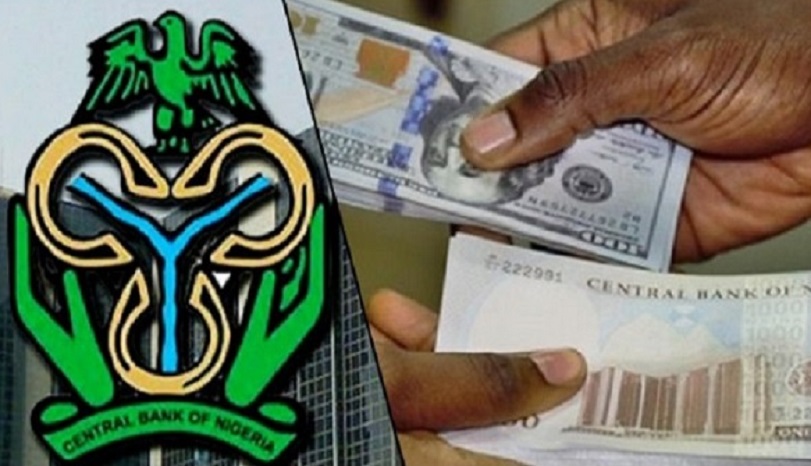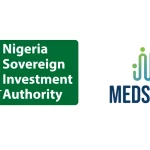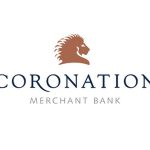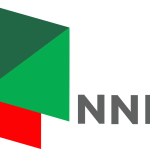Economy
Has Naira-settled OTC FX Futures Stabilized Naira Exchange Rate?
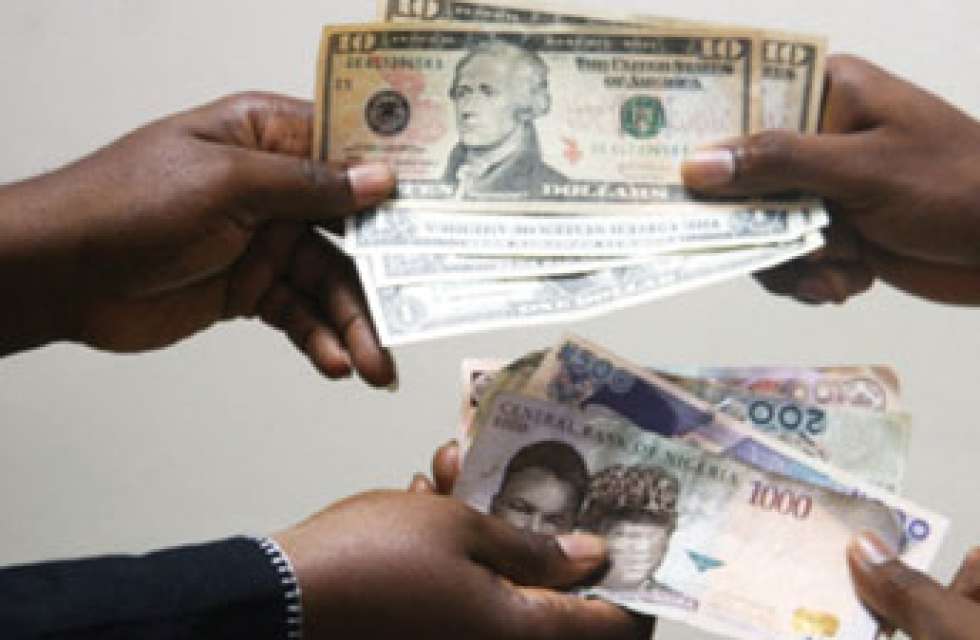
By Quantitative Financial Analytics Ltd
To stem the continued devaluation of the Naira and to breathe some air of stability into the ever-volatile Naira/Dollar relationship, the Central Bank of Nigeria (CBN) introduced some far-reaching measures at different times.
One of such measures was the launching of the Naira-settled OTC FX Futures Market. That “history making” event which commenced on June 27, 2016 made the CBN “the pioneer seller of the Naira-settled OTC FX Futures contracts on the FMDQ OTC Securities Exchange (FMDQ)”.
Before the advent of the Naira-settled OTC FX Futures, various governments in Nigeria had been tinkering with the Naira exchange rate management using different policy driven methodologies at different times.
In 1986, the Exchange Rate Liberalization Policy was introduced and with it, the Naira was devalued officially for the very first time on September 26, 1986 to be specific. From that day till today, the Naira has been heading south.
Economic and financial historians have it that Nigerian governments have tried to manage the exchange rate with the Foreign Exchange (Monitoring & Miscellaneous Provisions) (FEMM) Act of 1995, the two-way Quote System (market making) in the inter-bank FX market in 1996 and the Wholesale Dutch Auction System (WDAS) in 2006.
Unfortunately, it seems none of those worked. It is therefore not surprising that the currency futures market has been put in place as a way to “stabilize” the Naira.
It is now almost two years since the Naira-settled OTC FX Futures market was introduced and the question is ‘how far it has gone in stabilizing the Naira/Dollar exchange rate?’
Though the Naira/Dollar exchange rate continues to remain high, it is a bit comforting that the new FX currency risk exposure management instrument, (the Naira-settled OTC FX Futures), has been able to curb or curtail the speed at which the Naira depreciates relative to the Dollar. At least, for over six months the rate has remained in the N360s to the $.
When used properly, Currency Futures are a veritable instrument of managing foreign currency risk exposure. This works well when there are buyers and sellers and probably not so well when there are buyers with the CBN as the only seller.
By definition, a futures contract is an agreement between two parties where one (the buyer) agrees to buy and the other, (the seller) agrees to sell a given amount of the underlying asset or subject of the contract, at an agreed price on future date.
A futures contract entails a long position by one party and a corresponding short position by another. It does look like the CBN is the seller or the short position party in the Naira-settled OTC FX futures contracts although it is not apparent who the long position parties are.
By their nature, futures are zero sum games. Futures do not involve an initial cash flow, meaning that money does not change hands at the initiation of the contract except where commissions are charged but subsequently, it becomes apparent how much the parties to a contract will pay/receive as the price of the underlying instruments change from day to day.
The method of determining the amount payable/receivable by either party is called marking to market, (the technicalities involved in mark to market calculation will not be part of this discuss).
Market Activity
It is noteworthy to point out that the Currency Futures market in Nigeria has been very active and vibrant since inception although the momentum seems to be reducing as rates converge.
On the date that the market went live, it recoded $26.73 million in open interest. As at April 6, 2018, the open interest had increased to $3,278.43 million, an increase of 12176 percent. This underscores the extent of Nigeria’s dependence on and demand for the dollar, among other implications.
The implication of this is also that, if the CBN is the only party that holds the short positions, it means that the CBN has contracted to sell $3,278.34 million to various parties over a range of period depending on the maturity dates of the contracts.
However, the Naira-settled OTC FX Futures are non-deliverable, meaning that the CBN is not going to sell or deliver $3,278.34 million to the long position holders; rather, the CBN will pay them the difference between the contract price and the NIFEX/NAFEX rate as at the maturity date of each futures contract.
It will be recalled that the first futures contract matured on July 27, 2016, and the CBN had to pay N962.23 million to the long position holder.
For the almost two years of existence of the FX Futures market in Nigeria, 21 of such contracts have matured. Looking at the contract prices of the open trades in relation with the current exchange rate, there is indication that the CBN will be at the paying end of the contracts.
According to analysis by analysts at Quantitative Financial Analytics, the total notional value of all contracts from inception to date is $11.743 billion while total matured contracts stand at $8.464 billion, leaving current outstanding open interest at $3.278 billion.
Out of the matured contracts, the short position holders (probably the CBN) have paid an estimated $503.8 million to the long position holders, according to the analysis.
As said before, currency futures are derivatives, and derivatives are high risk instruments, if used properly, they are beneficial but when misused, they can lead to catastrophe.
To a large extent and in most recent times, the FX currency futures market has helped in stabilizing the Naira Dollar exchange rate although the decreasing momentum arising from convergence of rates may diminish its role in managing the currency risk exposure of Nigerians. We are watching
Economy
Police, Capital Market Regulators Partner for Nigeria’s Economic Growth
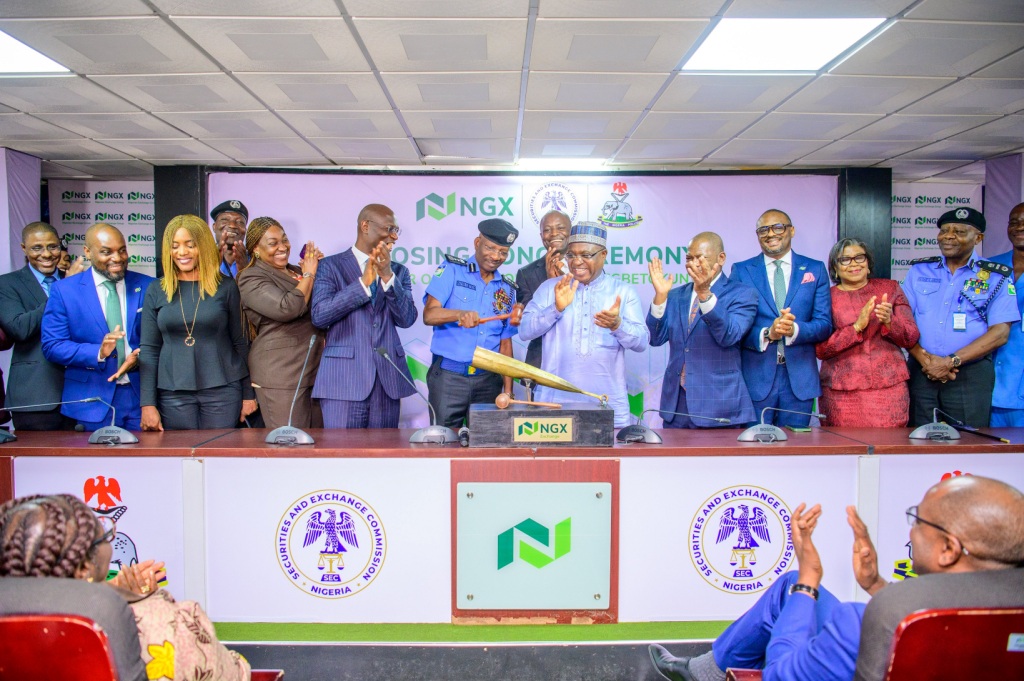
By Aduragbemi Omiyale
The Nigeria Police Force (NPF) has promised to work with the Securities and Exchange Commission (SEC) and the Nigerian Exchange (NGX) Group Plc for the prevention of financial crime, and the reinforcement of trust and confidence in Nigeria’s capital market.
The Inspector General of Police, Mr Kayode Egbetokun, gave this assurance on Wednesday at the closing gong ceremony in his honour at the NGX in Lagos.
The police chief said, “A transparent and well-regulated capital market is vital to Nigeria’s economic growth. The Nigeria Police Force remains committed to working with regulators and market operators to prevent financial crime, protect investors, and uphold the integrity of our financial system.”
Earlier in his welcome address, the chairman of NGX Group, Mr Umaru Kwairanga, commended the leadership of the police in supporting market integrity.
“Market integrity is a shared responsibility. By honouring the Inspector-General of Police, we are reinforcing the importance of institutional alignment in protecting investors and preserving trust in our financial system.
“Strong collaboration between regulators, enforcement agencies, and market infrastructure institutions is essential to building a resilient and credible market that supports economic growth,” he stated.
The Director-General of SEC, Mr Emomotimi Agama, while speaking, emphasized the importance of coordinated enforcement, noting: “Investor protection is at the core of market regulation, and today’s engagement highlights how critical collaboration with law enforcement is to achieving that mandate. This partnership strengthens our enforcement capacity, enhances deterrence against illegal investment activities, and reinforces confidence in the Nigerian capital market.”
As for the chairman of NGX Limited, Mr Ahonsi Unuigbe, “A transparent and orderly market can only thrive where rules are respected and misconduct is addressed decisively. The presence of the Nigeria Police Force in this collective effort sends a strong signal that safeguarding the market is a national priority.”
Similarly, the chief executive of NGX Group, Mr Temi Popoola, stressed the importance of aligning innovation with oversight, pointing out that, “Technology and market growth must be supported by strong enforcement and investor protection frameworks. Our collaboration with the SEC and the Nigeria Police Force reflects a unified approach to preserving the credibility of Nigeria’s capital market.”
Economy
NASD OTC Exchange Closes Green by 0.09%

By Adedapo Adesanya
The NASD Over-the-Counter (OTC) Securities Exchange rallied by 0.09 per cent on Wednesday, February 4, amid renewed appetite for unlisted stocks.
This lifted the NASD Unlisted Security Index (NSI) by 3.18 points to 3,641.30 points from the previous session’s 3,641.30 points and raised the market capitalisation by N1.9 billion to N2.180 trillion from the N2.178 trillion quoted on Tuesday.
The bourse recorded three price gainers and four price losers at the midweek session.
The advancers were led by Air Liquide Plc, which went up by N2.04 rise to end at N22.53 per share versus the previous session’s N20.49 per share, Central Securities Clearing System (CSCS) added 97 Kobo to sell at N44.97 per unit versus N44.00 per unit, and Acorn Petroleum Plc appreciated by 2 Kobo to N1.37 per share from N1.35 per share.
On the flip side, Geo-Fluids Plc lost 55 Kobo to sell at N6.26 per unit versus N6.81 per unit, Nipco Plc depreciated by 48 Kobo to trade at N259.00 per share versus N259.48 per share, FrieslandCampina Wamco Nigeria Plc declined by 40 Kobo to N63.10 per unit from N63.50 per unit, and Industrial and General Insurance (IGI) depleted by 1 Kobo to 65 Kobo per share from 66 Kobo per share.
Yesterday, the volume of trades slid by 64.5 per cent to 2.5 million units from 7.0 million units, the value of transaction decreased by 53.2 per cent to N17.7 million from N37.9 million, and the number of deals went down by 47.1 per cent to 18 deals from 34 deals.
CSCS Plc remained the most traded stock by value on a year-to-date basis with 16.0 million units valued at N652.6 million, followed by FrieslandCampina Wamco Nigeria Plc with 1.7 million units exchanged for N111.2 million, and Geo-Fluids Plc with 11.7 million units traded for N76.1 million.
CSCS Plc was also the most active stock by volume on a year-to-date basis with 16.0 million units sold for N652.6 million, trailed by Mass Telecom Innovation Plc with 13.3 million units worth N5.3 million, and Geo-Fluids Plc with 11.7 million units valued at N76.1 million.
Economy
Naira Rallies to N1,358/$1 at Official Market, N1,450/$1 at Parallel Market

By Adedapo Adesanya
The Naira rallied at the different segments of the foreign exchange (FX) market on Wednesday as supply continues to outweigh demand, giving it an edge against the United States Dollar.
In the parallel market, the Nigerian Naira improved its value on the greenback yesterday by N5 to quote at N1,450/$1 compared with the previous day’s N1,455/$1, and at the GTBank FX desk, it gained N3 to trade at N1,383/$1, in contrast to Tuesday’s exchange rate of N1,386/$1.
In the the Nigerian Autonomous Foreign Exchange Market (NAFEX), which is also the official market, the Naira firmed up against the Dollar at midweek by N14.63 or 1.1 per cent to settle at N1,358.28/$1 versus the preceding session’s N1,372.91/$1.
Against the Pound Sterling, the domestic currency appreciated on Wednesday by N14.16 to N1,863.43/£1 from the previous day’s N1,877.59/£1, and gained N13.73 on the Euro to end at N1,606.03/€1 versus the N1,619.76/€1 it was exchanged a day earlier.
The strengthening of the Naira value has been driven by the injection of forex into the financial markets by foreign investors seeking attractive investments in the emerging markets, helping to boost Nigeria’s external reserves, which provide the Central Bank of Nigeria (CBN) with the capacity to support the local currency.
As of February 4, 2026, the reserves reached $46.59 billion.
The local currency has been able to find a solid path despite no indications of any intervention from the apex bank in recent week, strengthening the case of price discovery.
Policy moves by the CBN is also offering a backbone for the FX market as it considers some strategic reforms through a policy known as the Single Regulatory Window.
In its 2025 Fintech Report, the central bank said this scheme will significantly reduce time-to-market for new digital financial products by streamlining licensing and supervisory processes across multiple agencies.
Meanwhile, the cryptocurrency market was in red amid a broad sell-off in global technology stocks, with reports showing that liquidity was notably thin, amplifying price moves and contributing to forced liquidations. The decline followed a sharp sell-off in global technology stocks overnight, where concerns over the pace of artificial intelligence adoption and rising capital spending by major firms weighed heavily on valuations.
Bitcoin (BTC) lost 7.9 per cent to sell at $70,534.94, Ripple (XRP) declined by 11.2 per cent to $1.42, Binance Coin (BNB) slumped by 9.4 per cent to $689.70, Ethereum (ETH) crashed by 8.9 per cent to $2,072.46, and Solana (SOL) dipped by 8.7 per cent to $89.86.
In addition, Dogecoin (DOGE) depreciated by 6.9 per cent to $0.1008, Cardano (ADA) slipped by 6.8 per cent to $0.2792, Litecoin (LTC) dropped 5.1 per cent to trade at $57.56, and US Dollar Tether (USDT) went down by 0.1 per cent to $0.9980, while the US Dollar Coin (USDC) closed flat at $1.00.
-

 Feature/OPED6 years ago
Feature/OPED6 years agoDavos was Different this year
-
Travel/Tourism9 years ago
Lagos Seals Western Lodge Hotel In Ikorodu
-

 Showbiz3 years ago
Showbiz3 years agoEstranged Lover Releases Videos of Empress Njamah Bathing
-

 Banking8 years ago
Banking8 years agoSort Codes of GTBank Branches in Nigeria
-

 Economy3 years ago
Economy3 years agoSubsidy Removal: CNG at N130 Per Litre Cheaper Than Petrol—IPMAN
-

 Banking3 years ago
Banking3 years agoSort Codes of UBA Branches in Nigeria
-

 Banking3 years ago
Banking3 years agoFirst Bank Announces Planned Downtime
-

 Sports3 years ago
Sports3 years agoHighest Paid Nigerian Footballer – How Much Do Nigerian Footballers Earn






